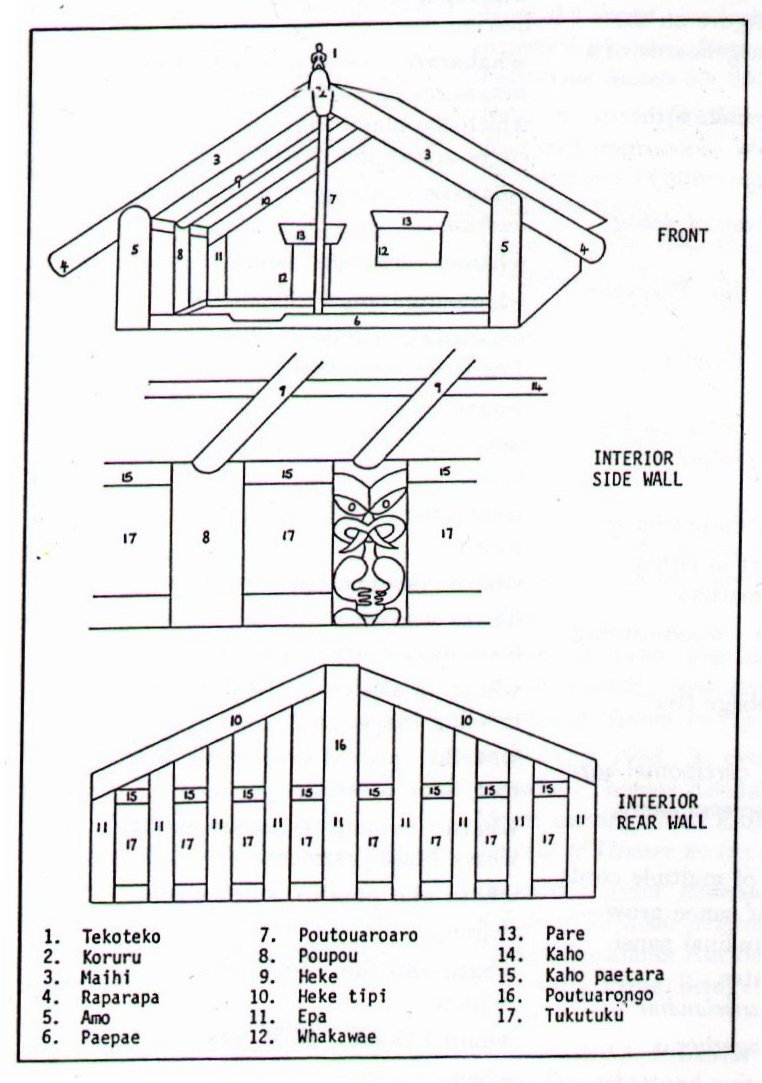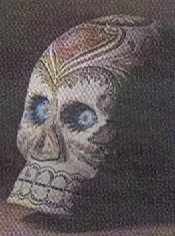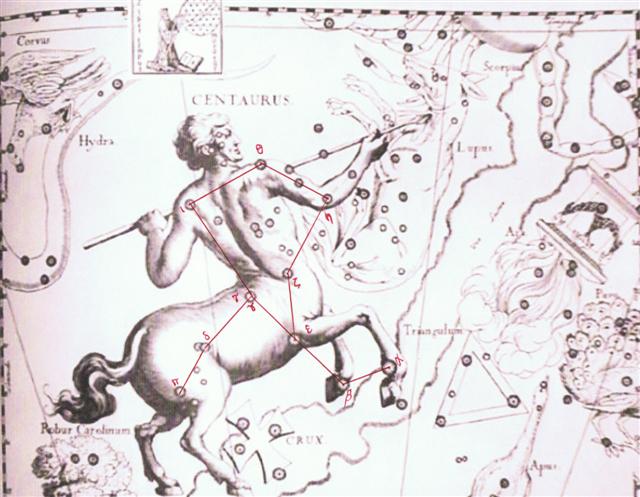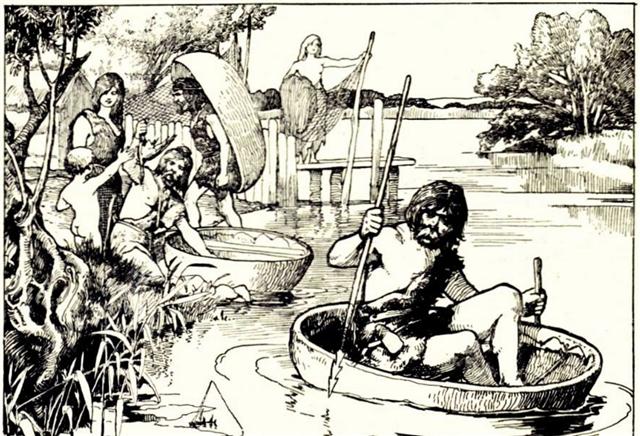Once again. The round topknot at te heke in Ca2-1 has now aquired additional meaning for us - it ought to represent a male topknot up in the rafters:
... But little Maui stood up for himself. 'Well then, I'd better go, I suppose', he said. 'Since you say so, I must be someone else's child. But I did think I was yours, because I know I was born at the edge of the sea, and you cut off a tuft of your hair and wrapped me in it and threw me in the waves. After that the seaweed took care of me and I drifted about in the sea, wrapped in long tangles of kelp, until a breeze blew me on shore again, and some jelly-fish rolled themself around me to protect me on the sandy beach. Clouds of flies settled on me and I might have been eaten up by the maggots; flocks of seabirds came, and I might have been pecked to pieces. But then my great-ancestor Tama nui ki te rangi arrived. He saw the clouds of flies and all the birds, and he came and pulled away the jelly-fish, and there was I, a human being! Well, he picked me up and washed me and took me home, and hung me in the rafters in the warmth of the fire, and he saved my life ...
... Another year passed, and a man by the name of Ure Honu went to work in his banana plantation. He went and came to the last part, to the 'head' (i.e., the upper part of the banana plantation), to the end of the banana plantation. The sun was standing just right for Ure Honu to clean out the weeds from the banana plantation. On the first day he hoed the weeds. That went on all day, and then evening came. Suddenly a rat came from the middle of the banana plantation. Ure Honu saw it and ran after it. But it disappeared and he could not catch it. On the second day of hoeing, the same thing happened with the rat. It ran away, and he could not catch it. On the third day, he reached the 'head' of the bananas and finished the work in the plantation. Again the rat ran away, and Ure Honu followed it. It ran and slipped into the hole of a stone. He poked after it, lifted up the stone, and saw that the skull was (in the hole) of the stone. (The rat was) a spirit of the skull (he kuhane o te puoko). Ure Honu was amazed and said, 'How beautiful you are! In the head of the new bananas is a skull, painted with yellow root and with a strip of barkcloth around it.' Ure Honu stayed for a while, (then) he went away and covered the roof of his house in Vai Matā. It was a new house. He took the very large skull, which he had found at the head of the banana plantation, and hung it up in the new house. He tied it up in the framework of the roof (hahanga) and left it hanging there ...
Perhaps the creator of the C text had found compelling reasons to use a framework for his text which had the heliacal Gate of the Goat where June was beginning and where the Sun had reached Haedus II - around 3 * 71 = 213 years earlier than at my assumed time for rongororongo. And when at that time the Sun had risen together with Hamal in April 17 (107 = 472) this could have been observed from Menkent (θ Centauri) being close to the Full Moon in night number *213 (= 3 * 71).
June was the month of Father Light (Jupiter), when he reached his end, was beheaded: ... The month, which takes its name from Juppiter the oak-god, begins on June 10th and ends of July 7th. Midway comes St. John's Day, June 24th, the day on which the oak-king was sacrificially burned alive. The Celtic year was divided into two halves with the second half beginning in July, apparently after a seven-day wake, or funeral feast, in the oak-king's honour ... ... The manner of his death can be reconstructed from a variety of legends, folk-customs and other religious survivals. At mid-summer, at the end of a half-year reign, Hercules is made drunk with mead and led into the middle of a circle of twelve stones arranged around an oak, in front of which stands an altar-stone; the oak has been lopped until it is T-shaped. He is bound to it with willow thongs in the 'five-fold bond' which joins wrists, neck, and ankles together, beaten by his comrades till he faints, then flayed, blinded, castrated, impaled with a mistletoe stake, and finally hacked into joints on the altar-stone. His blood is caught in a basin and used for sprinkling the whole tribe to make them vigorous and fruitful. The joints are roasted at twin fires of oak-loppings, kindled with sacred fire preserved from a lightning-blasted oak or made by twirling an alder- or cornel-wood fire-drill in an oak log. The trunk is then uprooted and split into faggots which are added to the flames. The twelve merry-men rush in a wild figure-of-eight dance around the fires, singing ecstatically and tearing at the flesh with their teeth. The bloody remains are burnt in the fire, all except the genitals and the head. These are put into an alder-wood boat and floated down the river to an islet; though the head is sometimes cured with smoke and preserved for oracular use ...
At the time of the Bull this ought to have occurred in APRIL 1 (91 = 364 / 4), which was 152 - 91 = 61 precessional days earlier, and since then Haedus II had advanced to June 1. Father Light reigned until he reached the northern summer. Metoro said it was a time of tapu.
... At Opoa, at one of the last great gatherings of the Hau-pahu-nui, for idolatrous worship, before the arrival of European ships, a strange thing happened during our [the two priests of Porapora, Auna-iti and Vai-au] solemn festivity. Just at the close of the pa'i-atua ceremony, there came a whirlwind which plucked off the head of a tall spreading tamanu tree, named Paruru-mata'i-i-'a'ana (Screen-from-wind-of-aggravating-crime), leaving the bare trunk standing. This was very remarkable, as tamanu wood is very hard and close-grained. Awe struck the hearts of all present. The representatives of each people looked at those of the other in silence for some time, until at last a priest of Opoa named Vaitā (Smitten-water) exclaimed, - E homa, eaha ta 'outou e feruri nei? (Friends, upon what are you meditating?) - Te feruri nei i te tapa'o o teie ra'au i motu nei; a'ita te ra'au nei i motu mai te po au'iu'i mai. (We are wondering what the breaking of this tree may be ominous of; such a thing has not happened to our trees from the remotest age), the people replied. Then Vaitā feeling inspired proceeded to tell the meaning of this strange event I see before me the meaning of this strange event! There are coming the glorious children of the Trunk (God), who will see these trees here, in Taputapuatea. In person, they differ from us, yet they are the same as we, from the Trunk, and they will possess this land. There will be an end to our present customs, and the sacred birds of sea and land will come to mourn over what this tree that is severed teaches. This unexpected speech amazed the people and sages, and we enquired where such people were to be found. Te haere mai nei na ni'a i te ho'e pahi ama 'ore. (They are coming on a ship without an outrigger), was Vaitās reply. Then in order to illustrate the subject, Vaitā, seeing a large umete (wooden trough) at hand, asked the king to send some men with it and place it balanced with stones in the sea, which was quickly done, and there the umete sat upon the waves with no signs of upsetting amid the applauding shouts of the people ... (Teuira Henry, Ancient Tahiti.)
|












